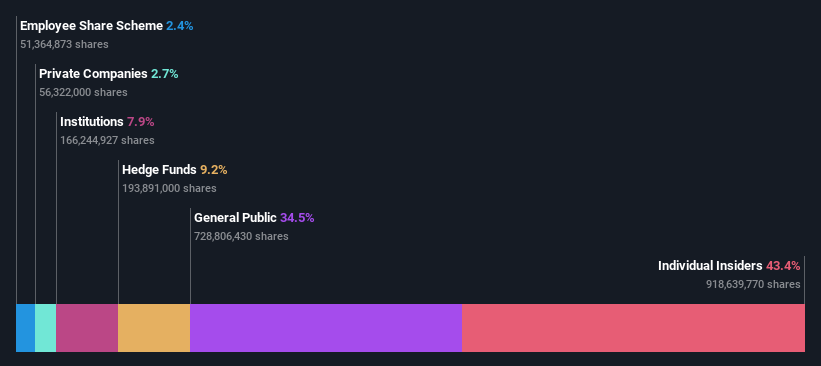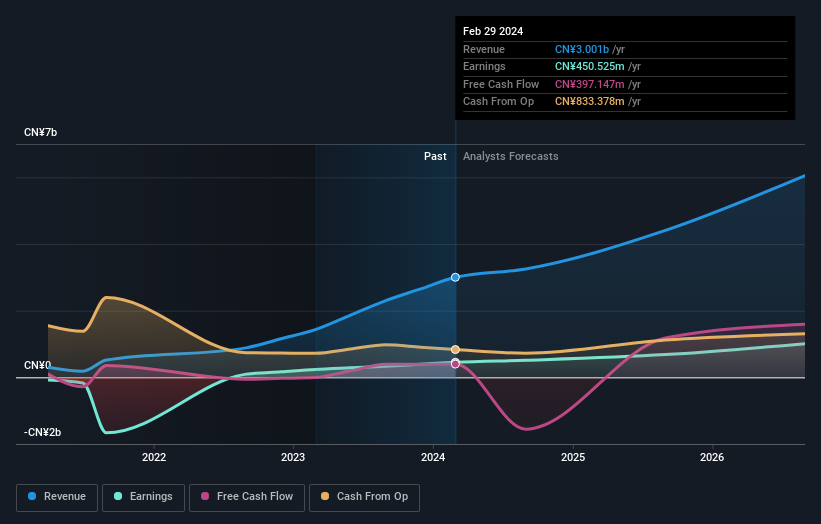- Hong Kong
- /
- Consumer Services
- /
- SEHK:1773
Insiders of Tianli International Holdings Limited (HKG:1773) must be frustrated after market cap dropped HK$1.7b since recent purchases

Key Insights
- Significant insider control over Tianli International Holdings implies vested interests in company growth
- A total of 2 investors have a majority stake in the company with 52% ownership
- Insiders have bought recently
If you want to know who really controls Tianli International Holdings Limited (HKG:1773), then you'll have to look at the makeup of its share registry. The group holding the most number of shares in the company, around 43% to be precise, is individual insiders. Put another way, the group faces the maximum upside potential (or downside risk).
And looking at our data, we can see that insiders have bought shares recently. However, with market cap down by HK$1.7b over the last week, their expectations were far from met.
Let's take a closer look to see what the different types of shareholders can tell us about Tianli International Holdings.
See our latest analysis for Tianli International Holdings

What Does The Institutional Ownership Tell Us About Tianli International Holdings?
Institutional investors commonly compare their own returns to the returns of a commonly followed index. So they generally do consider buying larger companies that are included in the relevant benchmark index.
As you can see, institutional investors have a fair amount of stake in Tianli International Holdings. This implies the analysts working for those institutions have looked at the stock and they like it. But just like anyone else, they could be wrong. If multiple institutions change their view on a stock at the same time, you could see the share price drop fast. It's therefore worth looking at Tianli International Holdings' earnings history below. Of course, the future is what really matters.

Our data indicates that hedge funds own 9.2% of Tianli International Holdings. That worth noting, since hedge funds are often quite active investors, who may try to influence management. Many want to see value creation (and a higher share price) in the short term or medium term. The company's CEO Shi Luo is the largest shareholder with 43% of shares outstanding. In comparison, the second and third largest shareholders hold about 9.2% and 3.9% of the stock.
To make our study more interesting, we found that the top 2 shareholders have a majority ownership in the company, meaning that they are powerful enough to influence the decisions of the company.
Researching institutional ownership is a good way to gauge and filter a stock's expected performance. The same can be achieved by studying analyst sentiments. Quite a few analysts cover the stock, so you could look into forecast growth quite easily.
Insider Ownership Of Tianli International Holdings
While the precise definition of an insider can be subjective, almost everyone considers board members to be insiders. Management ultimately answers to the board. However, it is not uncommon for managers to be executive board members, especially if they are a founder or the CEO.
I generally consider insider ownership to be a good thing. However, on some occasions it makes it more difficult for other shareholders to hold the board accountable for decisions.
It seems insiders own a significant proportion of Tianli International Holdings Limited. It has a market capitalization of just HK$7.6b, and insiders have HK$3.3b worth of shares in their own names. It is great to see insiders so invested in the business. It might be worth checking if those insiders have been buying recently.
General Public Ownership
The general public-- including retail investors -- own 34% stake in the company, and hence can't easily be ignored. This size of ownership, while considerable, may not be enough to change company policy if the decision is not in sync with other large shareholders.
Next Steps:
I find it very interesting to look at who exactly owns a company. But to truly gain insight, we need to consider other information, too. Take risks for example - Tianli International Holdings has 1 warning sign we think you should be aware of.
If you are like me, you may want to think about whether this company will grow or shrink. Luckily, you can check this free report showing analyst forecasts for its future.
NB: Figures in this article are calculated using data from the last twelve months, which refer to the 12-month period ending on the last date of the month the financial statement is dated. This may not be consistent with full year annual report figures.
Valuation is complex, but we're here to simplify it.
Discover if Tianli International Holdings might be undervalued or overvalued with our detailed analysis, featuring fair value estimates, potential risks, dividends, insider trades, and its financial condition.
Access Free AnalysisHave feedback on this article? Concerned about the content? Get in touch with us directly. Alternatively, email editorial-team (at) simplywallst.com.
This article by Simply Wall St is general in nature. We provide commentary based on historical data and analyst forecasts only using an unbiased methodology and our articles are not intended to be financial advice. It does not constitute a recommendation to buy or sell any stock, and does not take account of your objectives, or your financial situation. We aim to bring you long-term focused analysis driven by fundamental data. Note that our analysis may not factor in the latest price-sensitive company announcements or qualitative material. Simply Wall St has no position in any stocks mentioned.
About SEHK:1773
Tianli International Holdings
An investment holding company, provides education management and diversified services in China.
Exceptional growth potential with proven track record.

